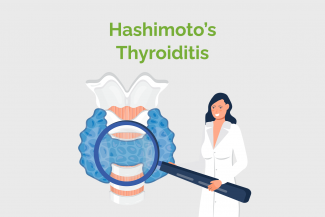Hashimoto’s thyroiditis, also called Hashimoto’s disease, is an autoimmune disease in which the thyroid is attacked by the body’s immune system, causing symptoms of hypothyroidism (underactive thyroid gland). It is most common among middle-aged women.

Are you at risk of getting Hashimoto’s disease?
Many factors are thought to play a role in causing Hashimoto’s disease. These include:
- Genes: Family members may have Hashimoto’s disease or other autoimmune diseases.
- Gender: Hashimoto’s thyroiditis is 7 times more common in women than men.
- Pregnancy: Pregnancy affects the thyroid. Some women have thyroid problems after having a baby, which usually go away. But about 20 percent of these women develop Hashimoto’s thyroiditis in later years. This suggests that pregnancy might trigger thyroid disease in some women.
- Too much iodine and some drugs like amiodarone (for treating heart rhythms), methemazole (antithyroid drugs), interferon-alpha (drugs used in treating cancer) may trigger the onset of thyroid disease in people who are prone to it.
- Radiation exposure has been shown to bring on autoimmune thyroid disease. This includes radiation from the atomic bomb in Japan, the nuclear accident at Chernobyl, and radiation treatment of Hodgkin’s disease (a type of blood cancer).
- Other autoimmune diseases such as:
- Vitiligo, a disease that destroys cells and leads to patchy loss of skin pigmentation
- Rheumatoid arthritis, a disease that affects the lining of the joints throughout the body causing painful swelling, which ultimately results in bone erosion and joint deformity
- Addison’s disease, which affects the adrenal glands that make hormones that help your body respond to stress and regulate your blood pressure and water and salt balance
- Type 1 diabetes, which causes blood sugar levels to be too high
- Graves’ disease, which causes the thyroid to make too much thyroid hormone (hyperthyroidism)
- Pernicious anaemia, which keeps your body from absorbing vitamin B12 and making enough healthy red blood cells
- Lupus, which damages many parts of the body, such as the joints, skin, blood vessels, and other organs
Changed
22/Jan/2025
Community
Condition









